Top 15 Wildlife Conservation Organizations Hiring
Looking for a career in wildlife conservation? The demand for professionals in this field is rising, with about 3,600 job openings annually between 2024 and 2034. Conservation organizations are hiring for roles ranging from entry-level to senior positions, offering competitive salaries and opportunities to make an impact. Here are 15 organizations currently hiring, along with details on their missions, job openings, and how to apply:
- World Wildlife Fund (WWF): Permanent roles in Washington, DC, with salaries up to $1.45M/year.
- The Nature Conservancy: Focused on sustainable solutions; requires skills like GIS and remote sensing.
- Wildlife Conservation Society (WCS): Offers roles in field science, policy, and park operations.
- Rainforest Alliance: Hiring for program management, sustainable agriculture, and field-based positions.
- LGL Limited: Seeks wildlife biologists, GIS specialists, and project managers; entry-level salaries start at $40K.
Visit each organization's career page or platforms like "Get Outdoor Jobs" to explore these opportunities and start building a meaningful career in conservation.
1. Get Outdoor Jobs
What They Do
Ready to Find Your Dream Outdoor Job?
Access thousands of outdoor industry jobs from top companies. Start your journey today and get matched with opportunities that align with your passion for the outdoors.
Get Outdoor Jobs is your go-to hub for outdoor industry careers. They bring together thousands of opportunities in one place, covering everything from conservation work to administrative roles. Whether you're passionate about hands-on fieldwork or prefer an office setting, this platform aims to help you find the right fit.
Job Opportunities You’ll Find
The platform features a wide range of openings, from beginner-friendly positions to highly specialized roles. You’ll also find flexibility with options for remote, hybrid, and onsite work, making it easier to match your skills and lifestyle.
How to Apply and What to Expect
Get Outdoor Jobs operates on a subscription model. A free plan gives you access to the 10 newest listings and basic search filters. Want more? The premium plan offers full access to all listings, advanced filters, daily updates, and email alerts - keeping you in the loop on the latest opportunities.
2. World Wildlife Fund (WWF)
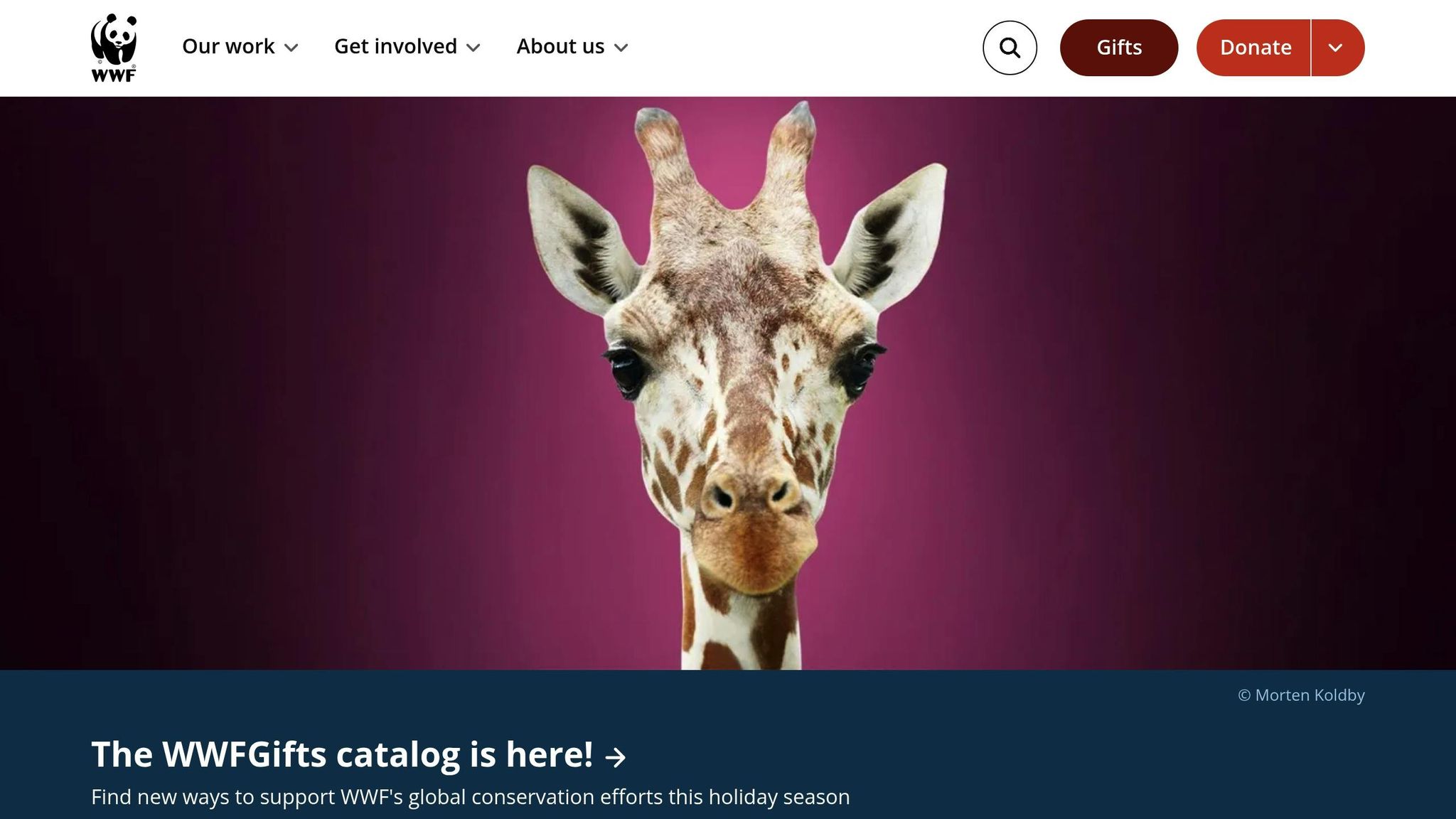
Organization Overview
The World Wildlife Fund (WWF) stands at the forefront of global efforts to protect wildlife and their habitats. Known for its dedication to conservation, WWF has been instrumental in safeguarding ecosystems and promoting sustainable practices worldwide.
Current Job Opening
WWF is currently offering a full-time, permanent position based in Washington, DC. The annual salary for this role ranges from $109,000 to $1,451,000, with applications being accepted until December 3, 2025.
3. The Nature Conservancy
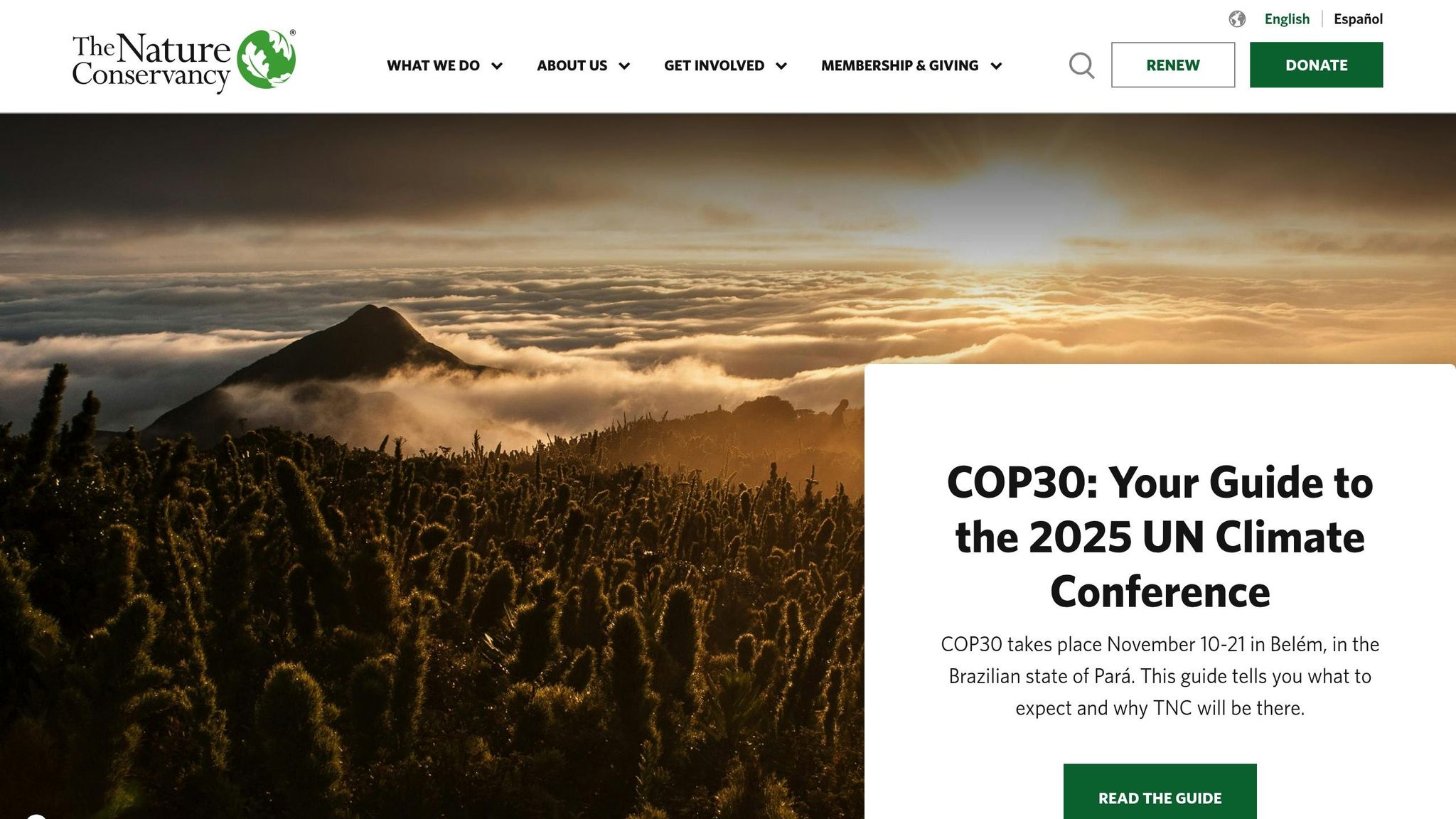
Organization Mission and Conservation Focus
"Guided by science, The Nature Conservancy creates innovative, on-the-ground solutions to our world's toughest challenges so that people and nature can thrive together."
The Nature Conservancy imagines a future where humanity's needs - like food, health, education, and employment - are met without compromising the rich diversity of life on Earth. Their mission is rooted in creating sustainable solutions that benefit both people and the planet.
Required Qualifications and Skills
If you're considering a role with The Nature Conservancy, here's what you need to know. A bachelor's degree in forestry, natural resources, or a related field is typically required. You'll also need technical expertise in areas like GIS, remote sensing, and computer modeling to analyze data and develop land management strategies.
The organization welcomes entry-level professionals, placing a high value on analytical skills, critical thinking, and strong communication abilities. They also look for candidates with management potential and the physical endurance needed for fieldwork. For veterans, The Nature Conservancy offers a U.S. Military Skills Translator tool, helping align military experience with available roles.
Some jobs may require specific state licenses or credentials, depending on the position and location. This mix of technical knowledge and a shared commitment to conservation makes The Nature Conservancy an inspiring choice for those passionate about protecting the natural world.
4. Wildlife Conservation Society (WCS)
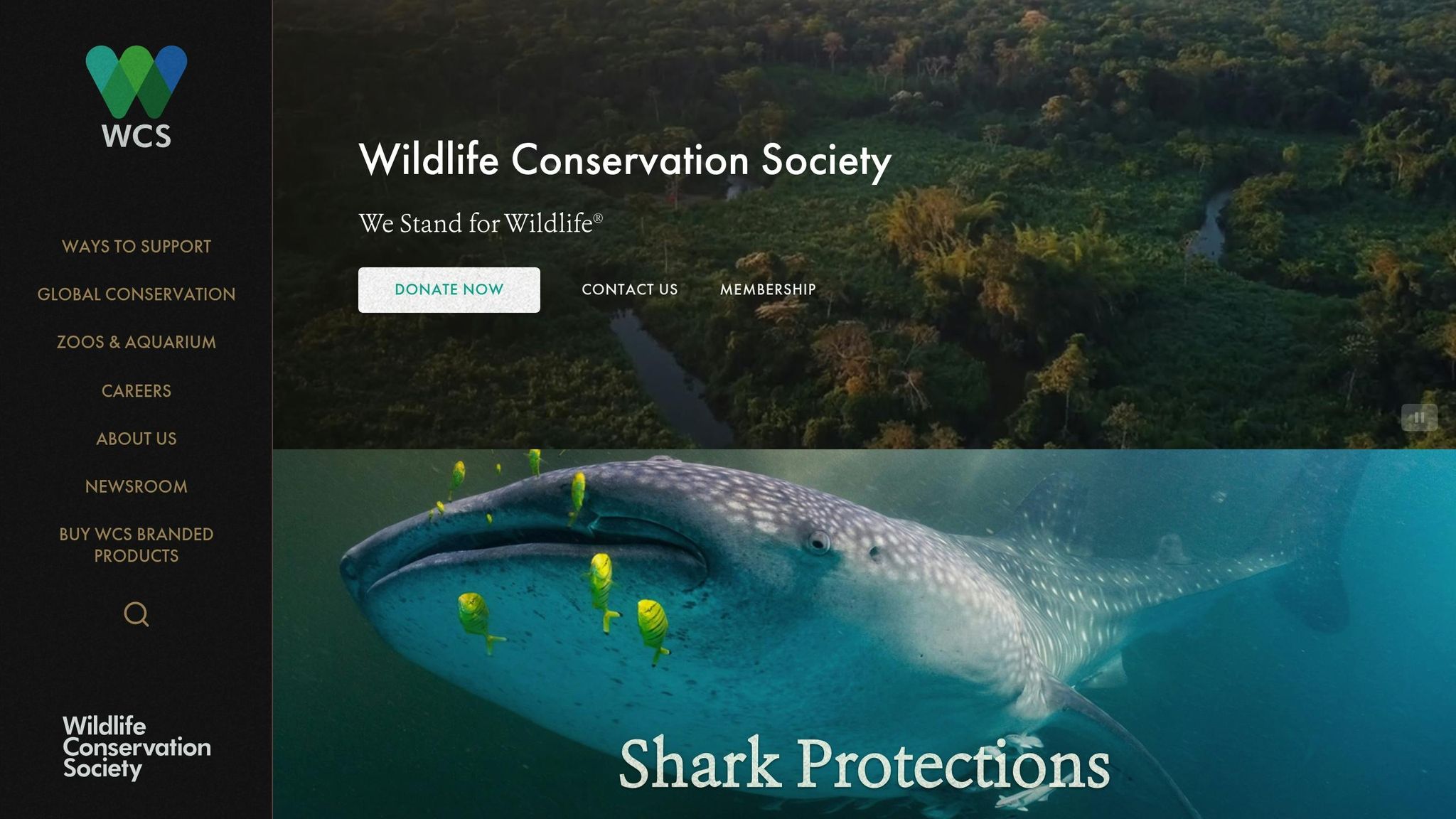
Organization Mission and Conservation Focus
"We save wildlife and wild places worldwide through science, conservation action, education, and by inspiring people to value nature."
The Wildlife Conservation Society (WCS) is dedicated to protecting wildlife and their habitats across the globe. Through a combination of scientific research, direct conservation efforts, and educational initiatives, WCS works to inspire people to appreciate and protect the natural world. This mission underpins every aspect of their work, including their approach to hiring.
Types of Roles Currently Hiring
WCS offers opportunities in a variety of areas, including:
- Field science
- Conservation policy
- Non-profit management
- Park operations
Required Qualifications and Skills
Applicants should bring a strong sense of commitment, a creative mindset, and a collaborative spirit. Specific skills will depend on the conservation field you’re applying to, but all roles require a passion for WCS’s mission and goals.
How to get a job in Wildlife & Nature Conservation - Volunteering, Tips, Advice, Q&A
5. International Fund for Animal Welfare (IFAW)
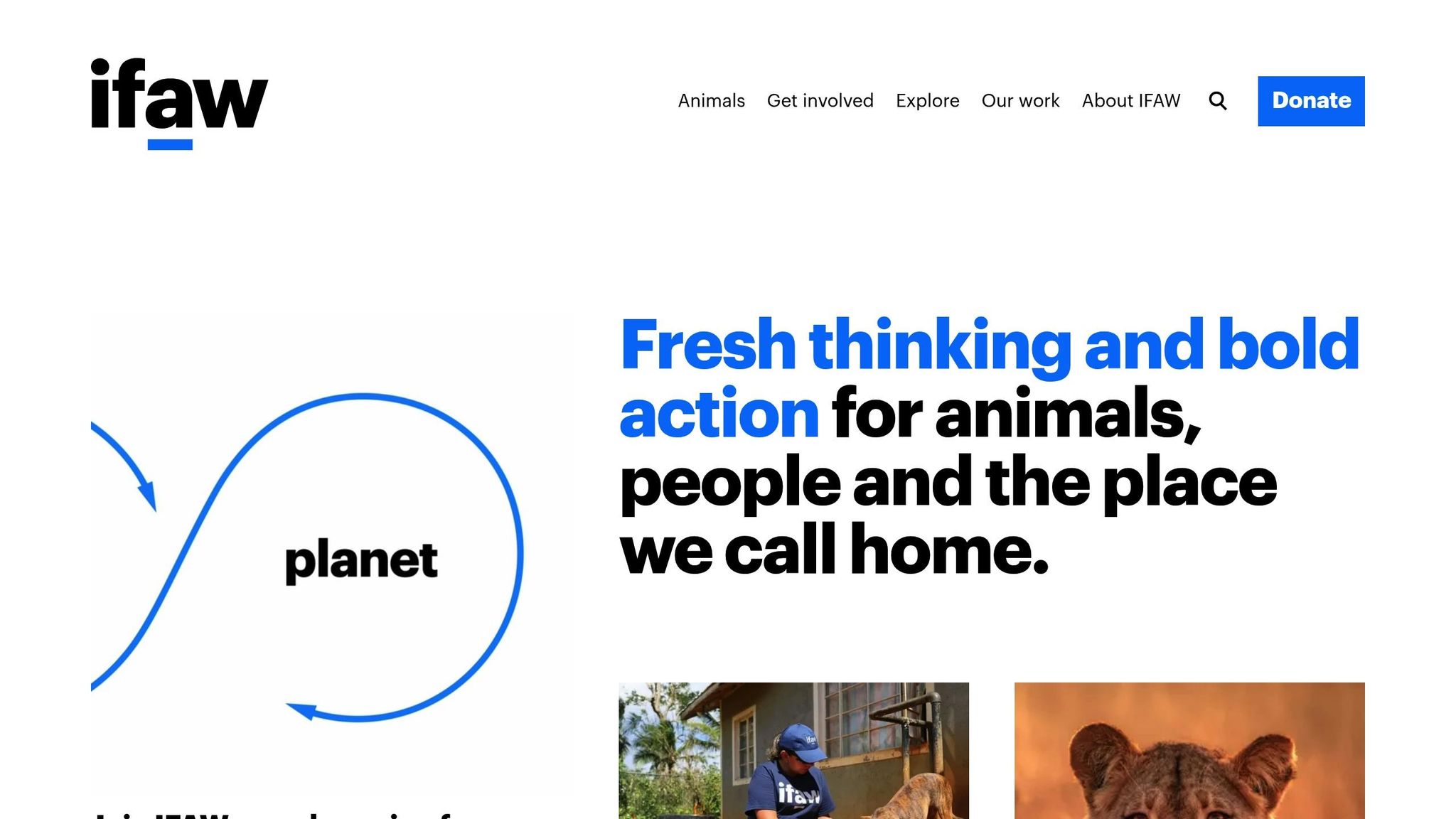
Specific details about IFAW's conservation priorities, current initiatives, or required qualifications for roles aren't provided here. For the most accurate and up-to-date information, check out the career opportunities on IFAW's official website.
6. National Audubon Society
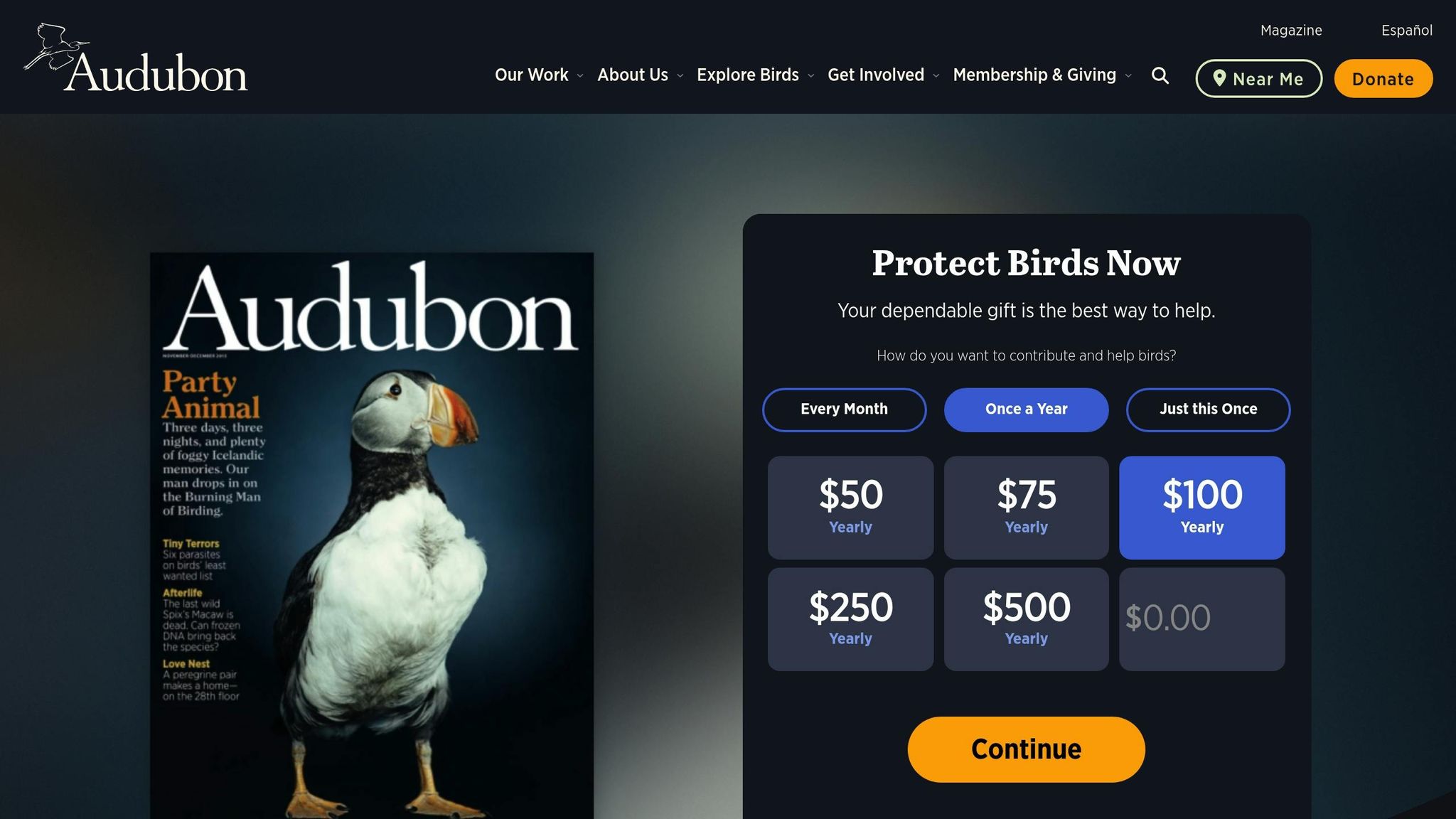
The National Audubon Society recently posted a job opportunity in Holly Springs, MS, though specific details about the conservation focus, responsibilities, and required qualifications weren’t provided. To get the most accurate and up-to-date information, head over to their official careers page. There, you’ll find a full list of open positions, the qualifications needed, and instructions on how to apply.
7. Defenders of Wildlife
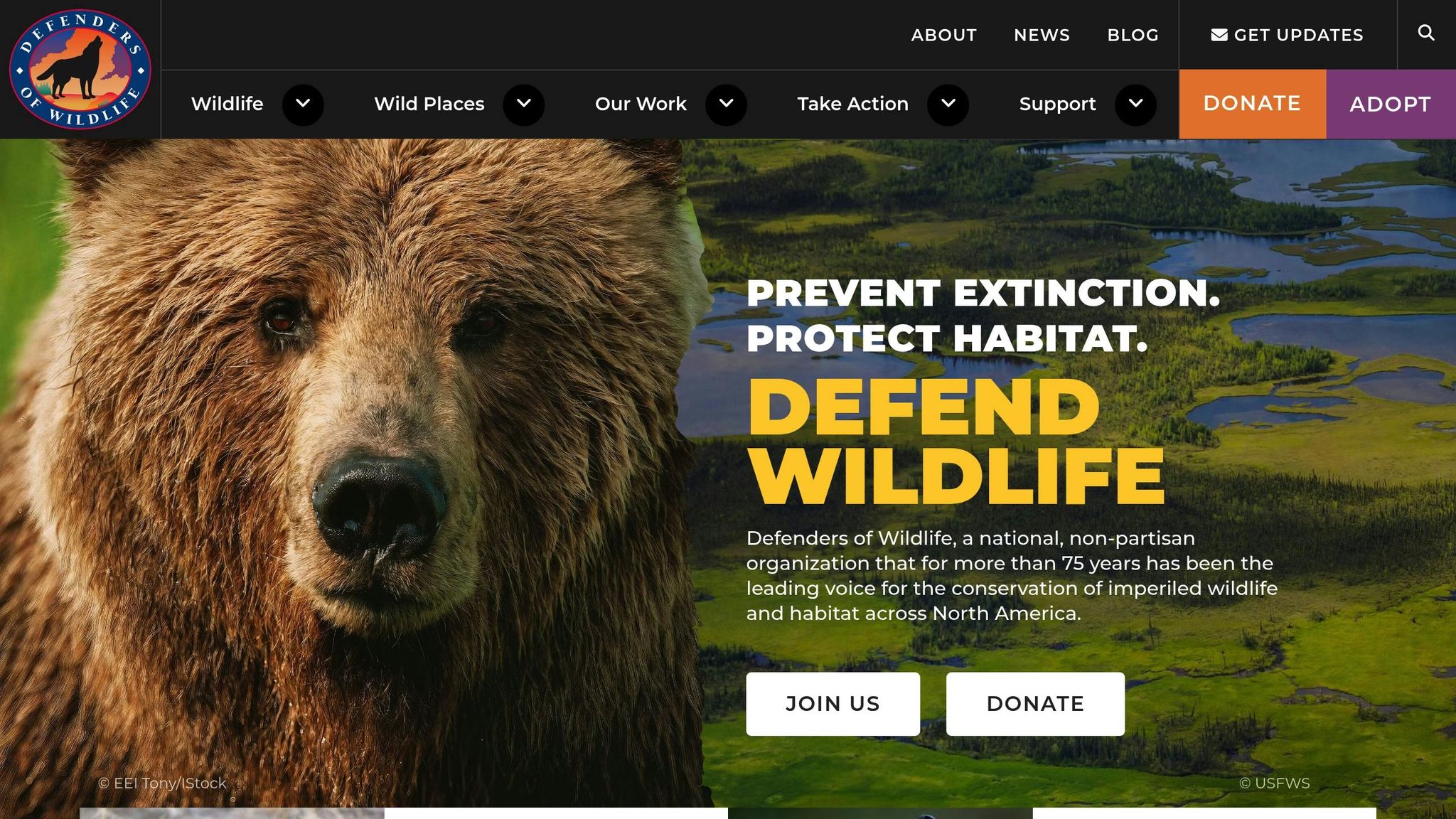
Defenders of Wildlife frequently seeks conservation professionals to join their team, though specific details about their mission and hiring processes can be sparse. This makes knowing where to find application resources and updates especially important.
Application Resources and Hiring Timelines
To explore current opportunities, head to the Defenders of Wildlife careers page, where you'll find job listings, detailed descriptions, and deadlines. Keep an eye out for seasonal roles that may be posted periodically.
Applications are typically reviewed on a rolling basis, and positions can range from remote jobs to field-based roles. Be sure to verify the location requirements for each position before applying.
For the latest updates on job openings, consider following the organization on social media or subscribing to their newsletters. This way, you’ll be among the first to know about new opportunities.
8. Conservation International
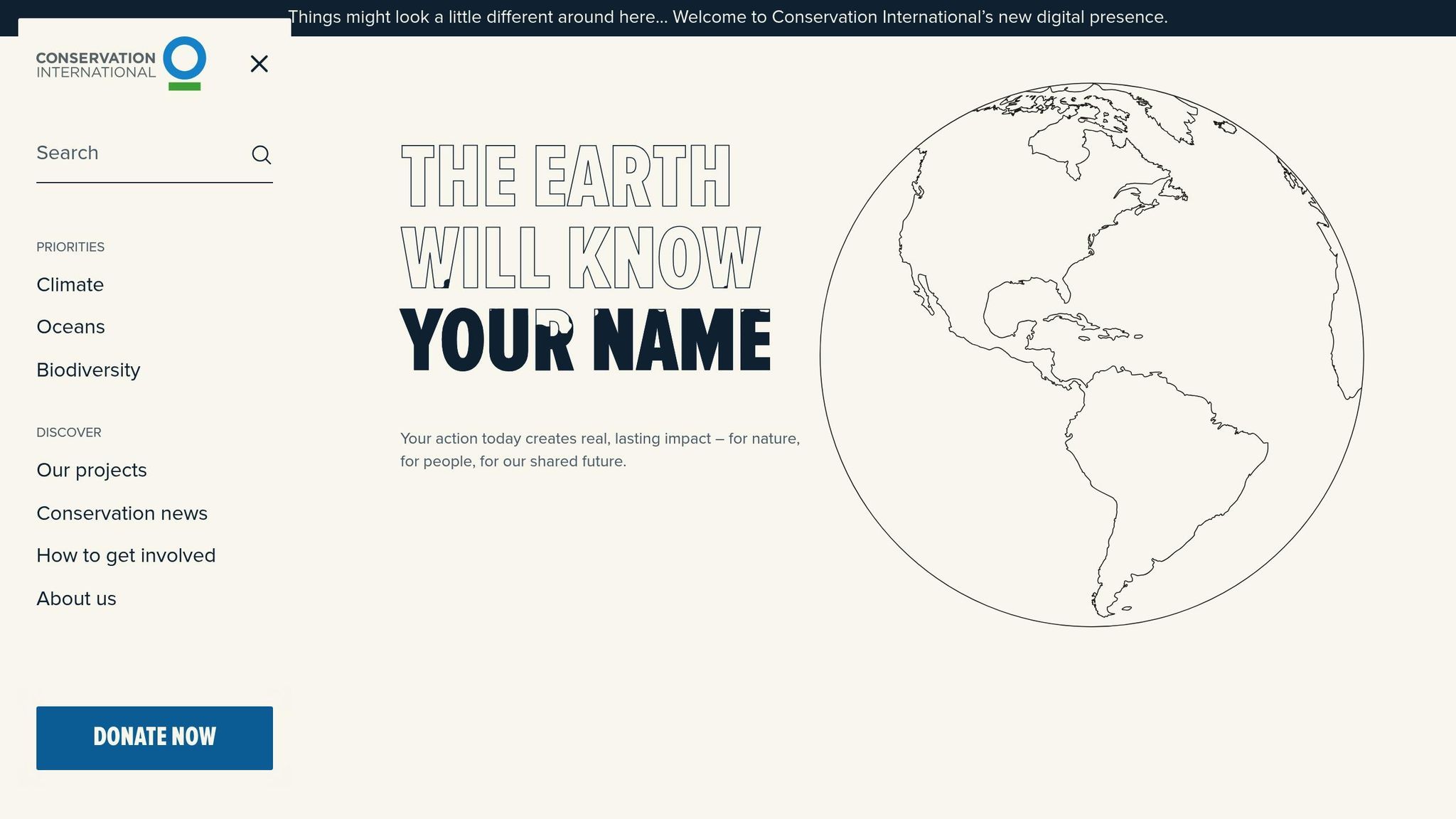
Conservation International stands out as a prominent organization dedicated to conservation efforts worldwide. To explore the latest job opportunities, head over to their official careers page. It’s the best place to find updated listings and learn more about roles that align with their mission.
sbb-itb-9d004f0
9. Rainforest Alliance
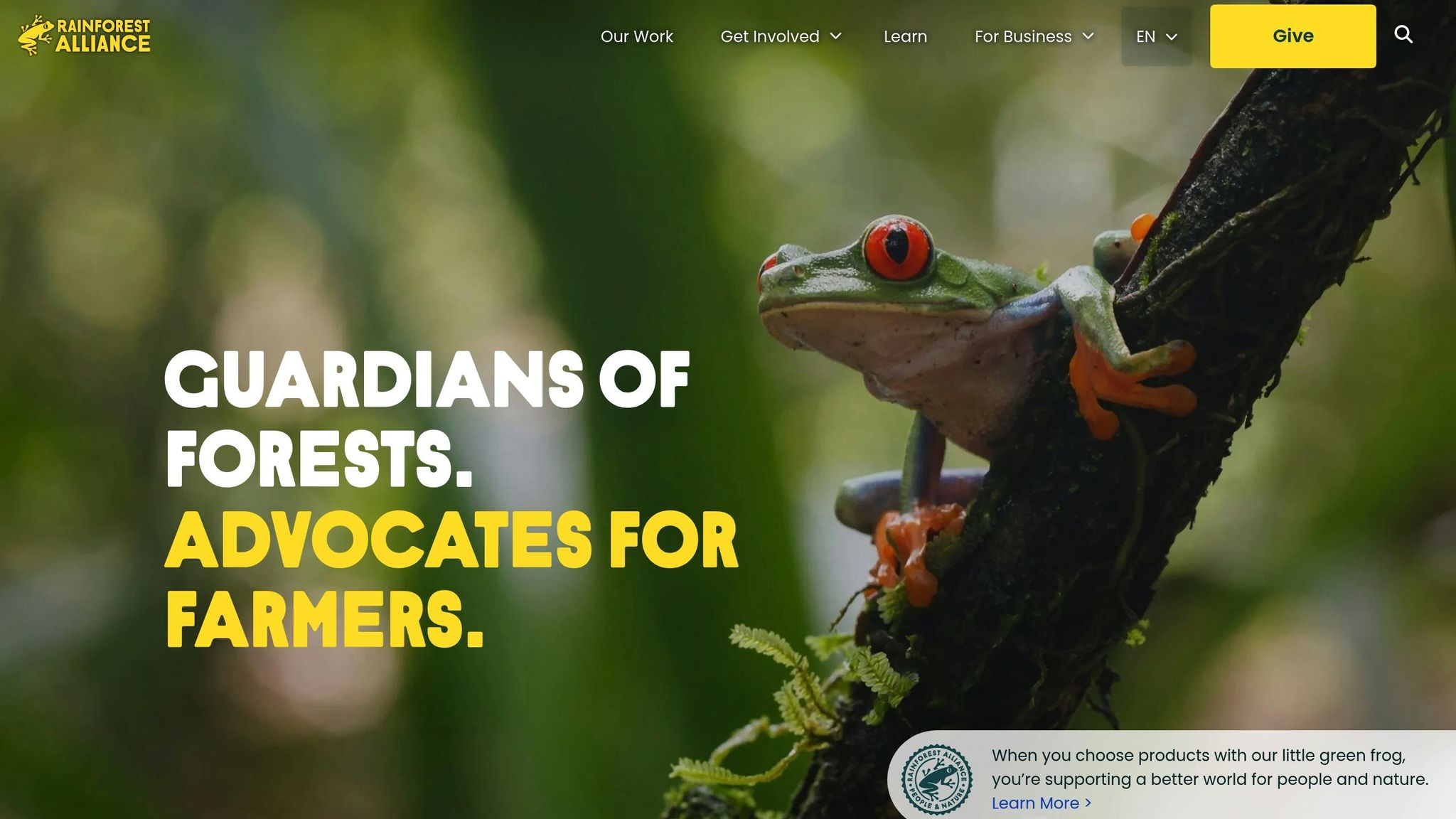
The Rainforest Alliance works to protect nature while supporting rural communities in more than 70 countries. This global nonprofit focuses on key goals like biodiversity conservation, addressing climate change, promoting sustainable farming, and preserving tropical forests. They prioritize collaboration with local communities and businesses to create positive environmental and social changes.
Organization Mission and Conservation Focus
As of 2023, the Rainforest Alliance has made a global impact, working with over 2 million farmers and managing more than 6 million hectares of land. In 2022 alone, they partnered with over 5,000 companies to source certified products and implement sustainability programs. One of their standout achievements is co-developing the Sustainable Agriculture Standard. In 2023, a partnership with Unilever led to a 15% reduction in deforestation risk and improved the livelihoods of 120,000 smallholder farmers in Kenya and India.
Types of Roles Currently Hiring
The Rainforest Alliance is currently hiring for roles in program management, sustainable agriculture, supply chain management, communications, fundraising, and field-based technical positions. Examples of open positions include Senior Associate for Sustainable Agriculture, Regional Program Manager, and Monitoring & Evaluation Specialist. These roles require a range of expertise, from hands-on fieldwork to high-level project management.
The organization offers both remote and hybrid work options, with some roles based in the U.S. and others internationally. There’s a growing need for professionals skilled in supply chain sustainability, climate adaptation strategies, and digital monitoring tools.
Required Qualifications and Skills
Most positions require a bachelor’s or master’s degree in fields like environmental science, natural resource management, agriculture, or related areas. Skills in project management, sustainable practices, communication, and data analysis are also key. For field-based roles, experience working with rural communities or conducting ecological assessments is often necessary.
Fluency in Spanish, Portuguese, or French can be a strong advantage. Certifications such as PMP (Project Management Professional), sustainability standards like Rainforest Alliance or FSC, and GIS expertise are highly valued. Additional experience in monitoring and evaluation frameworks, stakeholder engagement, and international environmental policy can make candidates stand out.
Application Resources and Hiring Timelines
Job openings are typically posted on the Rainforest Alliance’s official careers page, as well as on platforms like Indeed and LinkedIn. Applications usually involve submitting a resume and cover letter online, followed by one or more interviews (virtual or in-person) and, in some cases, a skills assessment or role-specific case study.
Timelines vary depending on the position, but most roles stay open for 2–4 weeks, with interviews conducted on a rolling basis. Field-based or project-specific roles may have shorter timelines, especially if tied to grant funding or seasonal needs. U.S.-based positions often offer salaries ranging from $60,000 to $110,000 annually, depending on experience and location. Stay tuned for more organizations shaping careers in wildlife conservation.
10. Kawartha Conservation
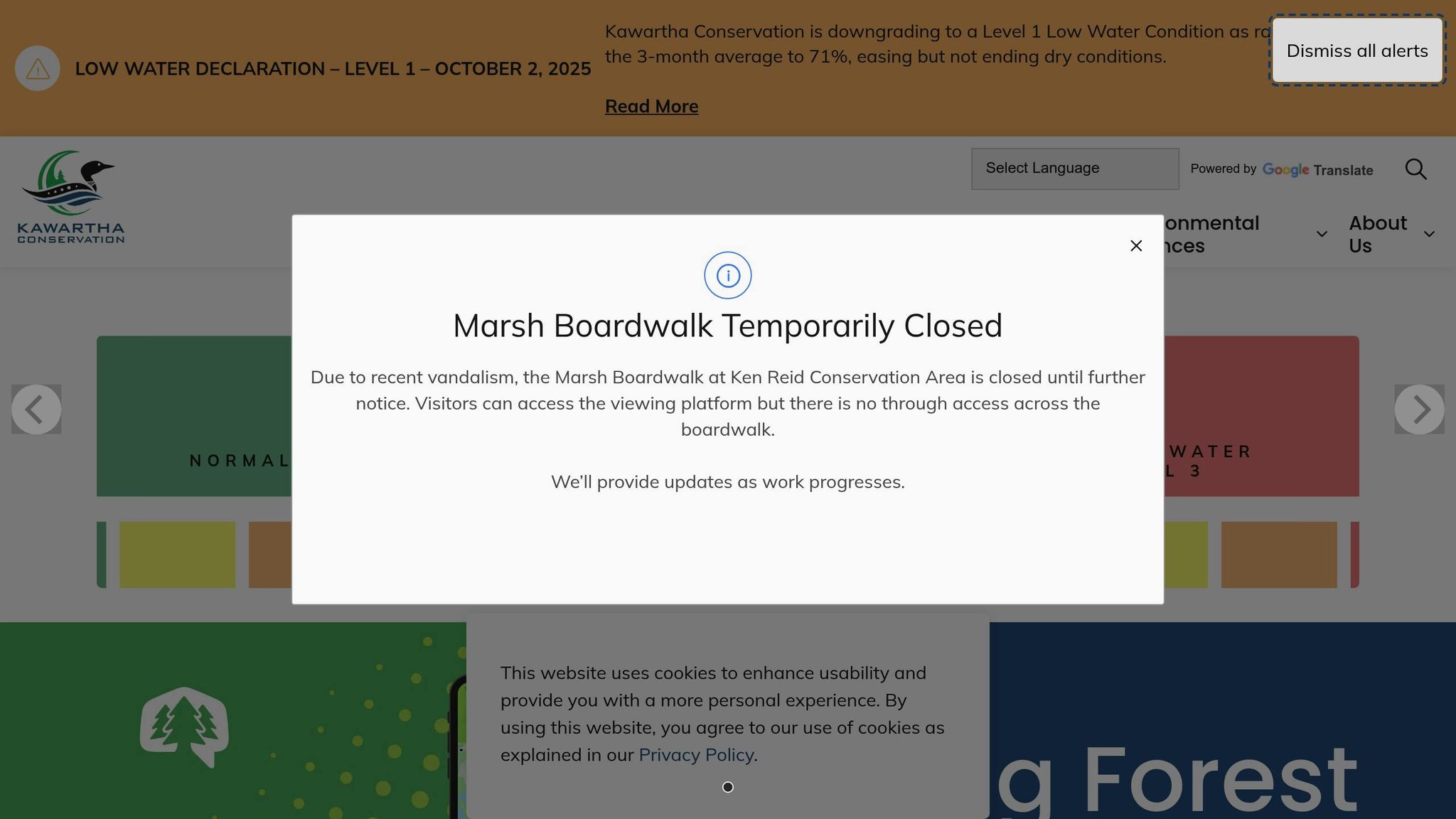
Kawartha Conservation serves as the steward of the natural environment in the Kawartha region of Ontario, Canada. Their work focuses on safeguarding watersheds and natural spaces through efforts such as watershed management, flood prevention, habitat restoration, and educational programs. These initiatives play a key role in maintaining crucial habitats for a variety of wildlife species.
If you're interested in joining their team, details about job openings and qualifications aren't currently listed publicly. For the latest updates, check out Kawartha Conservation's official website. Keep reading to discover more organizations offering opportunities in wildlife conservation careers.
11. Toronto and Region Conservation Authority
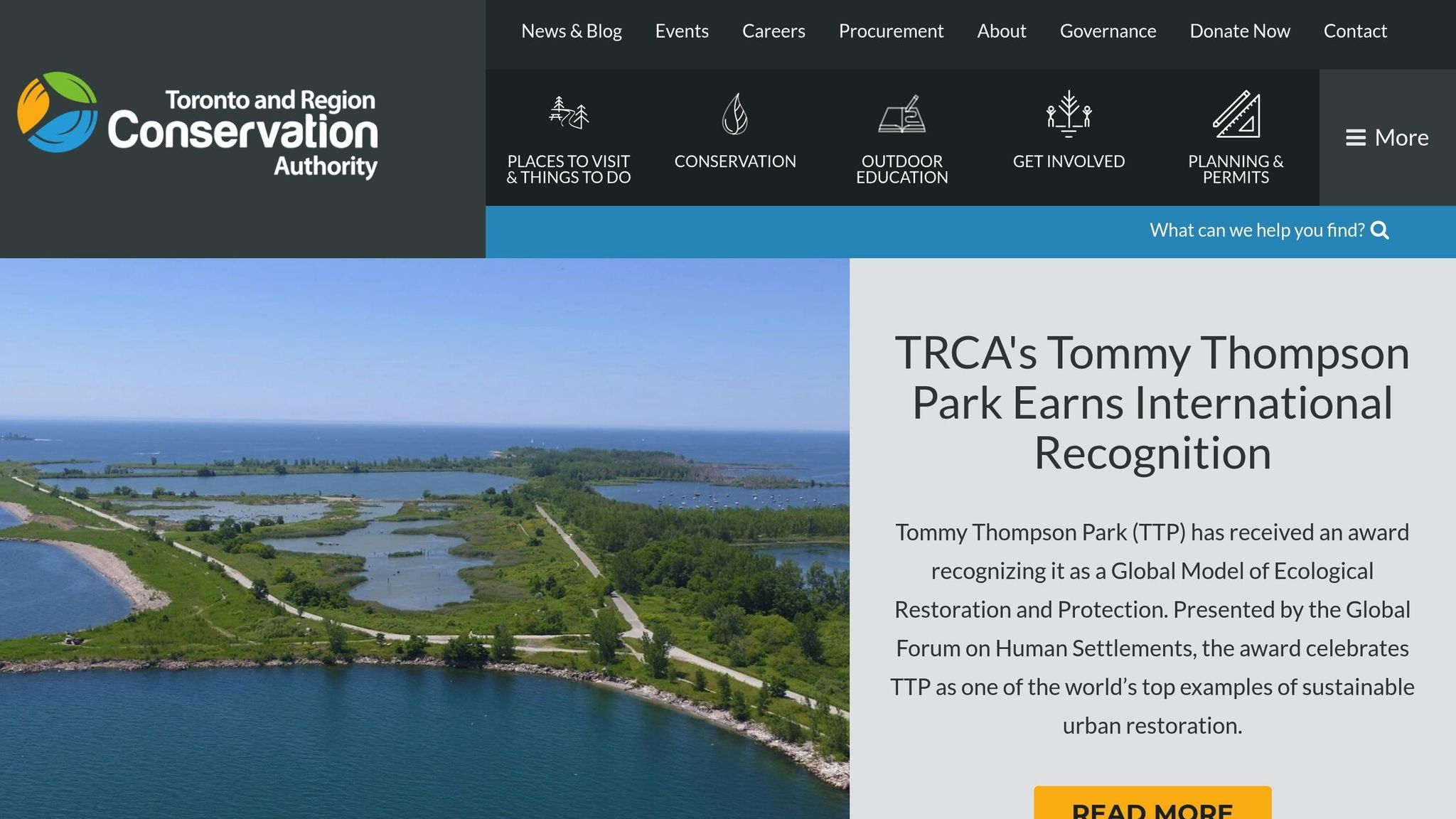
The Toronto and Region Conservation Authority (TRCA) plays an important role in safeguarding natural resources across the Greater Toronto Area (GTA). Its efforts are centered on ensuring environmental health and resilience in one of Canada's most urbanized regions.
Organization Mission and Conservation Focus
TRCA is dedicated to protecting and enhancing the natural environment in the GTA. Its work includes watershed management, flood protection, and ecosystem restoration, all aimed at maintaining a sustainable balance between urban development and ecological preservation.
Types of Roles Currently Hiring
Specific job openings are not listed at this time. For the latest updates on available positions, head over to the TRCA careers page.
Application Resources and Hiring Timelines
For detailed information about job opportunities and how to apply, visit the TRCA careers page. Keep in mind that hiring timelines may vary depending on the role.
12. Credit Valley Conservation
Credit Valley Conservation (CVC) is dedicated to safeguarding and revitalizing the watersheds within the Credit River system, which spans the Greater Toronto Area. While detailed information about their mission and initiatives isn't provided here, you can explore current career opportunities by visiting the CVC official careers page.
13. LGL Limited
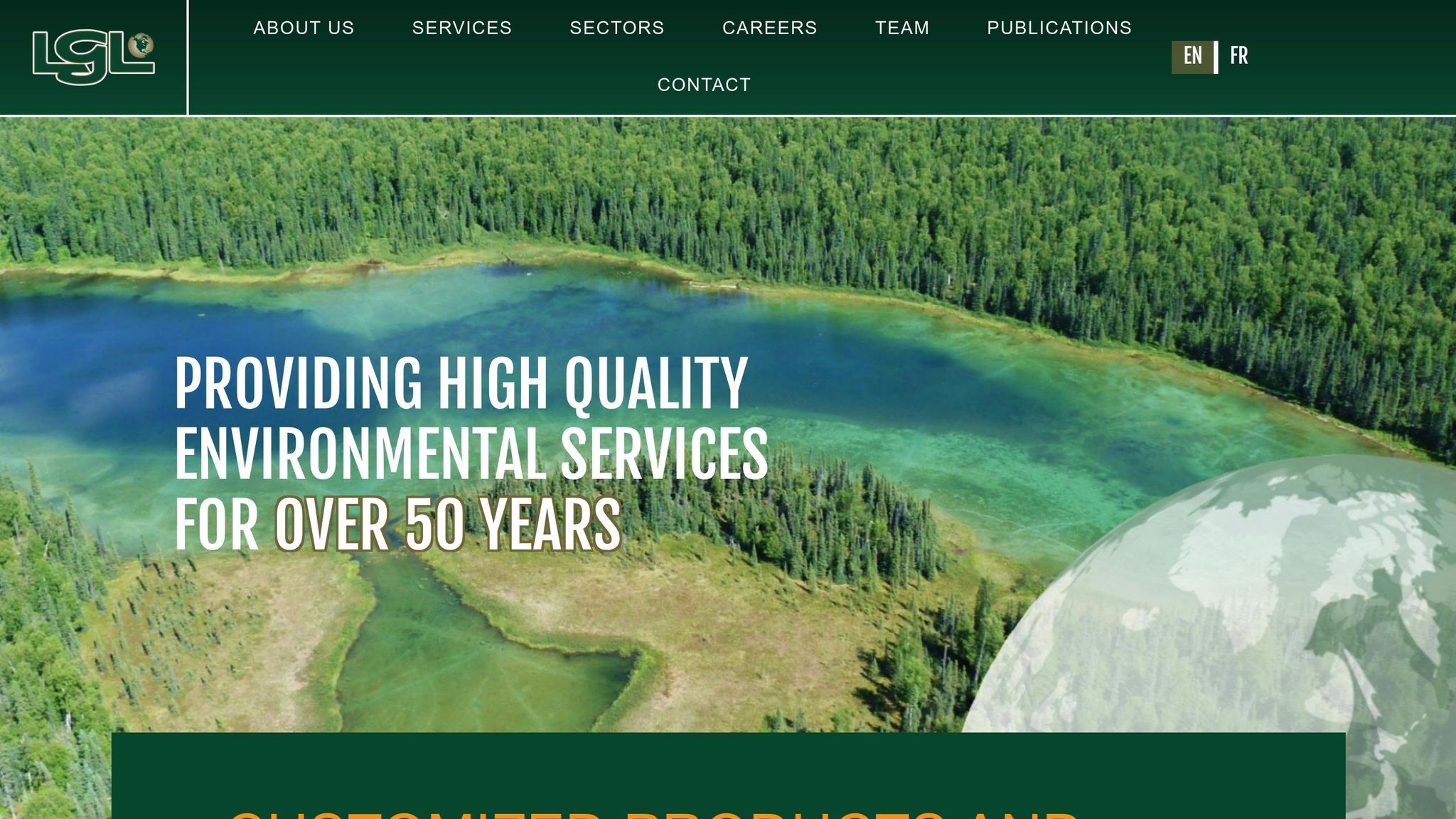
LGL Limited is a unique, employee-owned firm specializing in environmental research and consulting. With over four decades of experience, they focus on wildlife conservation, offering expertise in wildlife biology, fisheries science, habitat restoration, and environmental impact assessments. Their work spans both public and private sectors across North America, showcasing a strong commitment to conservation.
Organization Mission and Conservation Focus
LGL Limited's mission is to provide scientific expertise to support wildlife conservation, resource management, and environmental assessments. Their work includes ecological research, endangered species monitoring, biodiversity studies, and habitat restoration. Over the years, they've completed more than 4,000 projects, including federal contracts like avian and bat monitoring in Texas.
Their efforts cover critical areas such as monitoring migratory bird populations, conducting environmental assessments for infrastructure projects, and restoring wetland habitats. For instance, in 2021, the company spearheaded a fisheries habitat restoration project in the Pacific Northwest. Within two years, this initiative led to a measurable increase in salmon spawning success rates.
Types of Roles Currently Hiring
LGL Limited is currently looking for professionals like wildlife biologists, environmental scientists, ecological technicians, project managers, and GIS specialists. These roles are integral to their diverse conservation projects.
Key responsibilities include conducting field surveys, analyzing data, preparing reports, performing environmental impact assessments, and coordinating conservation initiatives.
Required Qualifications and Skills
Most roles require at least a bachelor’s degree in biology, ecology, or a related field. Advanced positions often call for a master’s or PhD with specialized knowledge in areas like ornithology, fisheries, or habitat modeling.
Candidates should have field research experience and be proficient in data analysis tools like GIS (e.g., ArcGIS) and statistical software (e.g., R, SPSS). Skills in remote sensing or drone technology are also highly valued. Strong communication, teamwork, and the ability to adapt to various field conditions are essential. Certifications such as HAZWOPER, First Aid/CPR, or wildlife handling permits can give applicants an edge.
Application Resources and Hiring Timelines
Interested candidates can apply through LGL Limited’s website or major conservation job boards. Applications typically require a resume, cover letter, and references, with some positions requesting writing samples or fieldwork documentation. The hiring process generally takes 2 to 8 weeks and includes virtual interviews and technical assessments.
Entry-level salaries range from $40,000 to $55,000, while senior roles offer over $70,000 along with benefits like health insurance, paid leave, and professional development opportunities. LGL Limited also invests in its employees' growth through mentorship, on-the-job training, and opportunities to lead projects or delve into advanced research. Employees can attend conferences, earn certifications, and collaborate on research with academic and government partners.
14. Hancock Wildlife Foundation
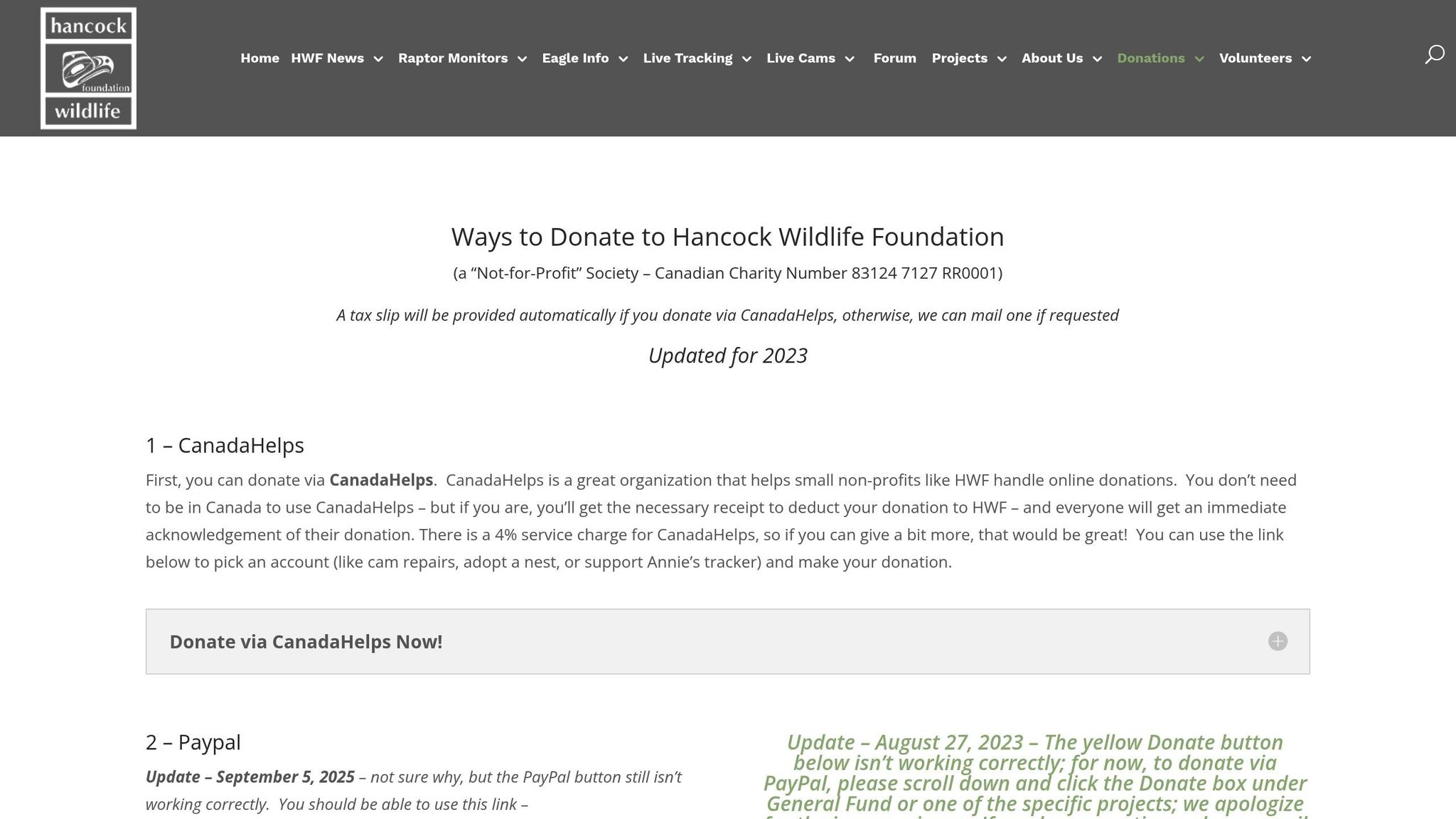
The Hancock Wildlife Foundation doesn't currently list any open positions or run active recruitment campaigns. To stay informed about potential opportunities, check their official website or reach out to the foundation directly.
Keep exploring other organizations that provide career paths in wildlife conservation.
15. The City of Mississauga Natural Areas Division
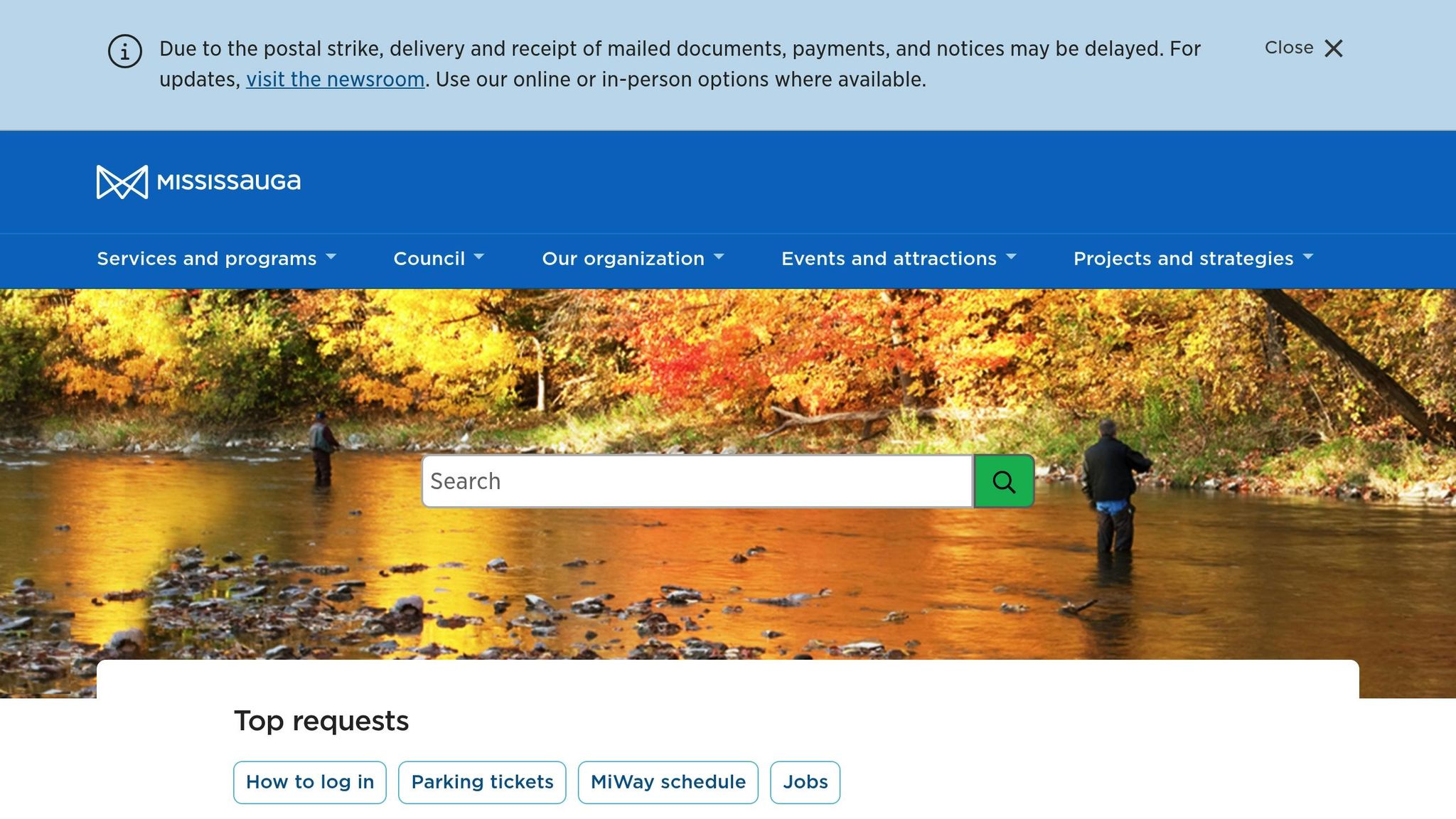
The City of Mississauga Natural Areas Division plays a key role in managing and protecting the city’s urban natural spaces. This municipal department focuses on preserving local ecosystems, promoting environmental awareness, and supporting native wildlife. Here's a closer look at their mission and how to explore job opportunities with them.
Mission and Conservation Efforts
The division is committed to safeguarding Mississauga’s natural habitats. Through habitat management and environmental education initiatives, they aim to restore urban ecosystems and ensure the longevity of green spaces within the city.
How to Apply and Hiring Details
If you’re interested in joining the team, head to the City of Mississauga’s official careers portal at mississauga.ca. There, you’ll find up-to-date job postings along with detailed qualifications for each role. Keep an eye on the portal for hiring timelines and application resources.
How to Build a Career in Wildlife Conservation
Breaking into wildlife conservation takes thoughtful planning, the right education, and hands-on experience. Over the years, the field has grown to include a variety of skills, meaning professionals now benefit from expertise that extends beyond traditional biology.
Educational Foundation
Most careers in wildlife conservation start with a strong academic background. For entry-level roles like zoologist or wildlife biologist, you’ll typically need a bachelor’s degree in areas such as zoology, wildlife biology, forestry, natural resources, agriculture, or general biology. These programs often combine classroom learning with lab work and field training.
For those aiming higher, advanced education is usually required. A master’s degree is often necessary for mid-level positions, while leading research roles typically call for a Ph.D.. In fact, many working in conservation today hold advanced degrees.
Technical Skills That Matter
Modern conservation work relies on more than just a love for nature - it’s increasingly tech-driven. Skills in Geographic Information System (GIS) technology, remote sensing, and computer modeling can set you apart. For fieldwork, practical abilities like species identification and holding the right licenses are essential.
Additionally, outdoor skills - like operating tractors, boats, ATVs, or generators - are a big plus when working in remote areas. These technical and practical abilities often make a critical difference in the field.
Gaining Practical Experience
A degree alone isn’t enough to secure a job in conservation. Employers look for hands-on experience, which you can gain through internships, volunteering, or seasonal work during college. These opportunities not only help you build skills but also allow you to form valuable professional connections.
As the field evolves, conservation employers increasingly value a variety of experiences and expertise, so diversifying your skill set is key.
The Changing Landscape of Conservation Careers
Wildlife conservation is no longer limited to traditional science roles. As Marco Lambertini highlights, today’s conservation work demands a broader range of skills. This shift has opened doors for professionals with backgrounds in areas like policy, communication, and technology, alongside conventional scientific training.
Standing Out in Applications
To stand out, start preparing early. Highlight the combination of your education, practical experience, and technical expertise when crafting your applications. A polished application that showcases these strengths can make all the difference.
Once you’re ready, explore platforms that specialize in conservation job listings to find roles that match your skills and interests.
Finding Opportunities
Platforms like Get Outdoor Jobs can connect you with the latest conservation job openings. Whether you’re looking for remote, hybrid, or onsite positions, these resources provide a centralized way to discover opportunities aligned with your goals.
Building a successful career in wildlife conservation takes dedication and persistence, but it’s a field filled with rewarding opportunities for those passionate about protecting the natural world.
Conclusion
Pursuing a career in wildlife conservation goes beyond just finding a job - it’s a chance to turn your passion for nature into meaningful work that safeguards the planet for future generations. These roles offer a unique blend of purpose and impact, allowing you to actively contribute to protecting the natural world.
The need for conservation has never been more urgent. With over one-third of U.S. fish and wildlife species at risk of extinction in the coming decades, every role in conservation plays a vital part in addressing this growing crisis. These careers not only provide the opportunity to make a difference but also come with competitive salaries and a flexible work-life balance.
Whether your interests lie in hands-on fieldwork, scientific research, public education, or shaping policy, there’s a wide range of paths to explore. Organizations like the Wildlife Conservation Society, with its mission to "save wildlife and wild places worldwide through science, conservation action, education, and by inspiring people to value nature", offer opportunities to work on both global and local scales. From preserving urban ecosystems to protecting endangered species across the globe, these organizations provide platforms for meaningful contributions.
Now is the time to take that first step. Visit the career pages of the organizations that resonate most with you, set up job alerts on specialized platforms, and craft application materials that showcase your passion and skills. Many conservation organizations review applications on a rolling basis, so starting your search today could lead to the opportunity of a lifetime.
Ready to make a difference? Head over to Get Outdoor Jobs to explore current openings and begin building a career that will help protect wildlife and preserve the natural world for the generations to come.
FAQs
What qualifications and skills do I need for a career in wildlife conservation?
For many entry-level jobs in wildlife conservation, having a bachelor's degree in areas such as zoology, wildlife biology, or environmental science is often a must. Employers also look for candidates who demonstrate strong communication abilities, excel at teamwork, and can stay organized in ever-changing settings.
Getting hands-on experience can make a huge difference. Internships, fieldwork, or volunteering with conservation groups can give you an edge when applying. Depending on the role, you might also need specific skills like data analysis or familiarity with GIS (Geographic Information Systems) to stand out.
What are the best ways to gain hands-on experience in wildlife conservation to boost my career prospects?
Gaining real-world experience in wildlife conservation can make a huge difference when it comes to landing a job in the field. Think about getting involved through volunteering, internships, or entry-level positions with conservation groups. These opportunities not only help you develop practical skills but also allow you to build valuable connections within the industry.
Local opportunities can also be a great starting point. You might assist with wildlife surveys, help out on habitat restoration projects, or participate in community education programs. Many organizations appreciate enthusiasm and commitment, so even small efforts can leave a lasting impression on your resume.
Additionally, consider pursuing workshops or certifications that are relevant to conservation work. Skills like GIS mapping, wildlife tracking, or environmental education can give you an edge in this competitive field and show potential employers that you’re serious about your career.
What are some common roles and responsibilities in wildlife conservation organizations?
Wildlife conservation organizations play a crucial role in safeguarding natural ecosystems, offering various positions that align with this mission. Here’s a look at some of the key roles:
- Wildlife Biologists: These professionals gather and analyze data about animals and their habitats. Their research helps shape strategies to protect species and maintain ecological balance.
- Wildlife Managers: They focus on sustaining healthy wildlife populations and habitats, often navigating the complexities of human-wildlife interactions.
- Public Educators and Outreach Specialists: Their work involves raising awareness about conservation challenges and inspiring communities to take action in protecting wildlife.
- Wildlife Law Enforcement Officers: These officers ensure that laws against illegal activities like poaching and trafficking are upheld, safeguarding endangered species.
Other essential roles include GIS Specialists, who use mapping technology to track habitat changes; Policy Analysts, who shape conservation policies; and Wildlife Technicians, who conduct fieldwork to support research and management efforts. These positions typically require a background in biology, environmental science, or communication, paired with a deep commitment to preserving the natural world.

